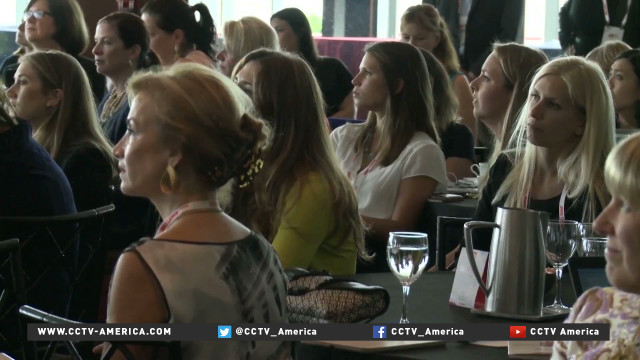Chinese President Xi Jinping joined other world leaders in a call to step up efforts to ensure gender equality in the next 15 years.
The 50-50 by 2030 campaign asks governments to improve policies and boost investment in that cause. This builds on the blueprint laid out in China during the Fourth World Conference on Women in 1995.
It’s been 20 years since the Beijing Platform for Action identified 12 critical areas of concern. But how much progress has been made to close the wage gap and empower women financially?
CCTV’s Rachelle Akuffo explored how far women have come.

World leaders set up efforts to ensure gender equality-
Chinese President Xi Jinping joined other world leaders in a call to step up efforts to ensure gender equality in the next 15 years. The 50-50 by 2030 campaign asks governments to improve policies and boost investment in that cause. This builds on the blueprint laid out in China during the Fourth World Conference on Women in 1995. It's been 20 years since the Beijing Platform for Action identified 12 critical areas of concern. But how much progress has been made to close the wage gap and empower women financially? CCTV's Rachelle Akuffo explored how far women have come.Beijing’s conference on women’s empowerment and gender equality, 20 years on
Two decades ago, participants and activists gathered in Beijing for the opening of the U.N. Fourth Conference on Women, aimed at global gender equality and the empowerment of women. Representatives from 189 countries produced a blueprint for advancing women’s rights.
The participating nations approved a document that focused on a dozen critical areas of concerns. One message from the conference that still echoes today is an iconic speech by former U.S. first lady Hillary Rodham Clinton, who said, “Human rights are women’s rights, and women’s rights are human rights.”
On Sept. 27, President Xi Jinping and the United Nations hosted the Global Leaders’ Meeting on Gender Equality and Women’s Empowerment: A Commitment to Action. “We should foster a global environment favorable for women’s development,” Xi said during the opening remarks. He then made a pledge of $10 million to U.N. Women, a group that focuses on furthering gender equality. China, Xi said, will initiate health-oriented projects, help create schools, and host 30,000 women from developing countries in China based-training programs over five years. The move comes twenty years after the 1995 conference.
The 1995 Platform for Action made commitments in twelve areas of concern:
- Women and the environment
- Women in power and decision-making
- The girl child
- Women and the economy
- Women and poverty
- Violence against women
- Education and training of women
- Institutional mechanisms for the advancement of women
- Women and health
- Women and the media
- Women and armed conflict
- Human rights of women
CCTV America looked at the progress of women’s wages and their role in the global economy. Melanne Verveer, a former U.S. delegation member and president of the Georgetown Institute for Peace, shared her memories and thoughts of what still needs to be done. Studio guest panelists, Sarah Iqbal with the World Bank and Lisa McGowan with the Solidarity Center discussed the issues revolving around the topic of women and wages in a slowing global economy.

Lisa McGowan and Sarah Iqbal on meaningful progress in gender equality
To dig deeper into the forum and women's issues around the world, Rachelle sat down with Lisa McGowan of the Solidarity Center and Sarah Iqbal, Program Officer of the World Bank's Women, Business and Law Project. She began by asking what they thought the most meaningful progress has been since the Beijing Platform for Action in 1995.- Lisa McGowan, The Solidarity Center
- Sarah Iqbal, The World Bank- Women, Business and the Law project
Beijing 20: What Does Meaningful Progress Look Like?
The Society for International Development, a Gender and Inclusive Development Workgroup in Washington, D.C. has held a year-long series called “Beijing 20: What Does Meaningful Progress Look Like?” The series marks the 20th anniversary of the Beijing Platform for Action by celebrating the 12 areas of concerns in the original blueprint outline. Earlier this year, the group partnered with World Learning, a non- profit group that aims to empower people and strengthen institutions through education, for a Washington, D.C. event. Participants attending– some of which were in Beijing in 1995 – shared their experiences.
- Sharon Kotok, former U.S. delegation member
- Alyse Nelson, Vital Voices Global Partnership

Alyse Nelson reflects on Beijing\'s conference on women
Two decades ago, participants and activists gathered in Beijing for the opening of the U.N. Fourth Conference on Women, aimed at global gender equality and the empowerment of women. Representatives from 189 countries produced a blueprint for advancing women’s rights.
Sharon Kotok reflects on Beijing\'s conference on women
Two decades ago, participants and activists gathered in Beijing for the opening of the U.N. Fourth Conference on Women, aimed at global gender equality and the empowerment of women. Representatives from 189 countries produced a blueprint for advancing women’s rights.
The World Bank’s Women, Business and the Law project recently released a report reviewing laws that restrict women’s employment and entrepreneurship. “Getting Equal” found that despite progress, legal barriers to the economic advancement of women are widespread, and that violence and lack of jobs are key barriers for future progress.
 CGTN America
CGTN America

